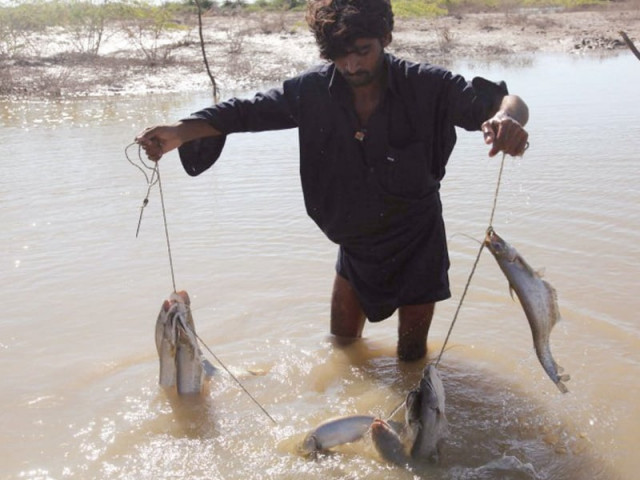In other pools, other wonders as Badin’s new fishermen find
The water left by the floods has given rise to a new entrepreneur.

In other pools, other wonders as Badin’s new fishermen find
While the 2011 floods washed away dozens of thriving fisheries in Badin, fishermen have found solace and a form of livelihood in the large pools of water that remain after the deluge.
“We came from Sukkur two months ago because the fishing here has become so good,” says Khameeso, as he stands atop a wooden boat. “When the rains came we knew that there would be more opportunities for fishing.”
Khameeso and about ten to fifteen men are up at dawn and on the water every day to try and catch as many fish as they can before sundown. The fishermen wade in the shallow part of the water, pushing and pulling the net to the tune of Khameeso’s gruff voice as he directs their movements and steers the boat accordingly.
As the net is hoisted, the sound of desperate fishtails slapping against the dirt joins Khameeso’s voice as he discerningly eyes the catch and instructs his men to cut some of the fish loose and back into the water.
Three different kinds of carp, Wallago, catfish, barramundi, a turtle and what looked like a snapper surfaced in one of their hauls. The catch is profitable enough for them to not care for the few fish that escape the net. Barramundi and snapper are saltwater fish and some fishermen say that they were mixed into the water because they were introduced here. Another said that it was because the seawater and saltwater had mixed.
“We catch a lot of fish but powerful people take care of this land and our catch mostly goes to them,” says Khameeso. He explained that some of the flooded land they fish on belongs to the government, and different landlords have staked their claim to fish in the pools.
Around 120 to 140 kg of fish is caught every day. The fishermen are paid around Rs5,000 to Rs6,000 daily, and distribute the money. Even though the fishing equipment is basic and Khameeso’s team can easily sustain the operation, the permission needed to fish in the pools is why they can’t be independent.
Additionally, the nets given to fishermen by landlords don’t meet the requirements set by the Fisheries Act of 1987 as they trap small and juvenile fish.
According to Faheem Raza, a research officer at the Participatory Development Initiatives NGO, “The government should focus on these fishermen and how to give them proper training, equipment and rights so they can earn for themselves.”
At a 20-minute drive from the pool is one of Badin’s main fish markets, and the stench of rotting fish is palpable 30 metres away.
“Dangri, malli, gulfaam!” scream the sellers, holding large weighing scales and displaying the catch which seems to be slowly baking under the sun.
“We have cold storage,” says Mohammad Alim, pointing to a couple of 4x2 ice coolers in his office, as he explained why the fish was in the sun. “We rent space out in front to private sellers.”
Alim says that the amount of fish being caught has increased by a 100% since the floods, and that no less than Rs1.5 million worth of fish is sold in the seven major fish markets of Badin. A lot of the fish sold is supplied to Sukkur, Hyderabad and Karachi and the rest is purchased by the local population and restaurants.
Sellers say that the fish is healthy and predictably, that they have never received any complaints about the quality of their catch. As long as these pools of water remain in Badin, so will the fish and the fishermen, filling the void left by the destruction of a large number of Badin’s formal fish farms.
Published in The Express Tribune, March 28th, 2012.



















COMMENTS
Comments are moderated and generally will be posted if they are on-topic and not abusive.
For more information, please see our Comments FAQ